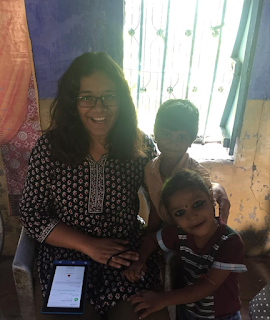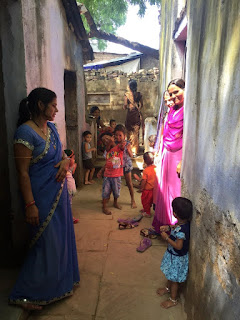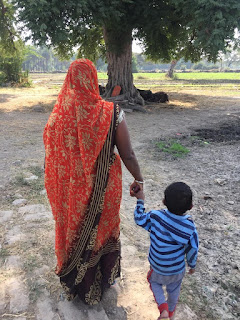


The importance of the First 1000 Days was only a concept that I had studied in my second year of college, as a part of the Indian Economic Development module. Infant Mortality Rate, Maternal Mortality Rate were just definitions to me, meant to be reproduced in examinations. I was taught their relation to Gross Domestic Product and per capita growth. Economics, at university level in India, is taught without emotion. We learn everything as it is. As it exists, without ever questioning it.
This lack of discourse, instead of demotivating me, encouraged me to find answers for myself. Post college, I studied liberal arts. There, I had to unlearn a few things which I had been taught as an economics student. Never assume things or preexistence of knowledge and never take things as they come- always question, protest, demand, rage – do whatever it takes to initiate change. If you want to be a changemaker, you have got to start from the start. By this, I mean to say that one needs to understand and appreciate the complexities involved in fighting the existing reality and building new models which will bring about a change. Numerous inefficiencies in health, education, security, food exist but our criticism counts if we do something about it.
With this in mind, I joined The Antara Foundation with hopes and dreams of shaking things up in the public health domain. My first few weeks were spent in digesting the information about the existing health system, government schemes, and TAF’s interventions. After that, I started making field visits to Anganwadi Centres in the sector allotted to me- Panwar. A sector is the third tier in the rural demography (District -> Block -> Sector -> Village). Panwar’s population is around 19000. I was assigned to the technology intervention; we have developed an application and provided Frontline Workers with tablets. This has been done with the intention of making the process of data collection easier. It has made coordination between the three FLWs easier, as data flows easily among them, making possible a three-way cycle. It makes data monitoring easy for us as well, as we have proper documentation and therefore, better identification of beneficiaries.

Photo: The ‘Honey Singh pose’ is a favourite among kids
I understood the economics/data collection part of it: baseline data collection (pre-intervention data), operational data (to see how the intervention is playing out). What I took time to understand are the stories behind these data points. These stories are the reason why I don’t dread waking up every day. How my health workers have reached the point they are at now, how some of them have overcome difficult personal problems, how they have managed to study so much, and how they take care of the children and other MCHN beneficiaries that come to their AWCs. They work at home, they work in their fields (literally), and they work in AWCs/SCs/PHCs/CHCs. Their ability to juggle their responsibilities and still do everything efficiently is inspiring to me. Their warmth and hospitality never fails to amaze me. I have learnt a lot from them, and I hope I continue to do so.

Photo: Smiling through the bad lighting
Another thought that came to my head was how we’ve been conditioned to focus on the end result, and never the journey that takes us to it. Here, I realized that the journey is just as important. During under-graduation, I had been trained to look at what the statistics and regression lines tell me. While, they are crucial for such interventions, I have been fortunate to learn the other part as well.
Another important part of this journey has been the result of my mild disdain for practical pursuits, which in this case would be to understand and memorize the directions to my AWCs. Sadly, my navigation skills aren’t quite up to the mark. When brainstorming about the title of this blog post, my coworker suggested Lost in Panwar, which does make a lot of sense because a minimum of 10-15 minutes of my time goes into finding the places that I’ve visited at least thrice now. This experience seems worth mentioning as nothing is more embarrassing than the fact that even your FLWs don’t trust you when it comes to finding your car. The good, and the bad, both need to be out.
Jhalawar in July (which is when I joined) is beautiful. Jhalawar, in other months is also beautiful. You just need to know where to look. The first two things I noticed here were the # of cows, and the # of flowers. Both these categories fascinated me to no end. Like a typical city person, I clicked pictures at every instance I could find in villages. They were just keepsakes- to remind me of a simpler world every time stuff gets complicated in office (Beat Plans, Open Data Kit, Sharepoint graphs.. you get the drift). Jhalawar has helped me in living more simply and slowly.
Fast forward to November: one lesson learnt is that it takes time to ‘shake up things’ (first job lessons, people). It’s been a heartwarming experience. Babies have taken selfies from my camera, ladies have offered me tea and sweets unfailingly- every time, school children have played games with me.

Photo: Mother-son duo showing the way to the AWC
For an economics student, this has been an eye-opening experience. I have learnt that we cannot understand things in silos. Everything is interconnected and interlinked. Our systems comprise of humans, after all. It is imperative to look at these systems holistically and not mechanically, as we have been used to doing.
Empathy, joy, gratitude is what my FLWs and the community has taught me. I can only hope I can offer something as precious back. Then, I’ll have fulfilled my hopes of attempting to make a change.
Notes:
MCHN: Maternal and Child Healthcare, and Nutrition
FLWs: Frontline Workers
AWC: Anganwadi Villages
SC: Sub Centres
PHC: Primary Health Centre CHC: Community Health Centre
Cearet Sood was a fellow with the Antara Foundation
Disclaimer: The article has been written in personal capacity, and the views and opinions expressed are those of the author